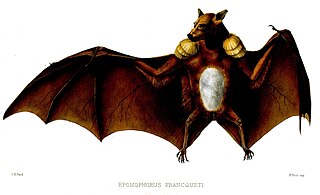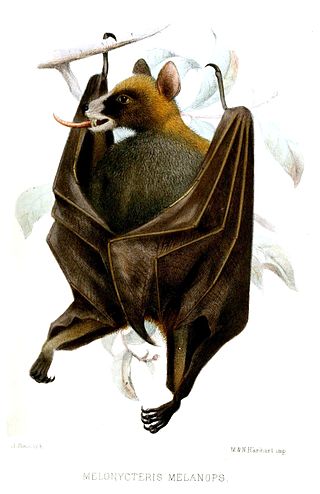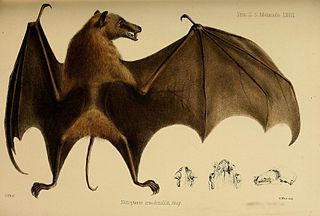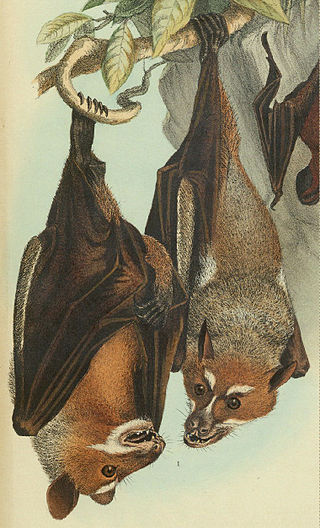
Megabats constitute the family Pteropodidae of the order Chiroptera (bats). They are also called fruit bats, Old World fruit bats, or—especially the genera Acerodon and Pteropus—flying foxes. They are the only member of the superfamily Pteropodoidea, which is one of two superfamilies in the suborder Yinpterochiroptera. Internal divisions of Pteropodidae have varied since subfamilies were first proposed in 1917. From three subfamilies in the 1917 classification, eight are now recognized, along with various tribes. As of 2018, 197 species of megabat had been described.

The eastern or Queensland tube-nosed bat is a megabat in the family Pteropodidae that lives in north-eastern Australia. N. robinsoni is one of the few species of megabat that roosts solitarily. They get their common name from their raised tubular nostrils which are unlike those of most other species in the family. They are a deep brown with gray heads and sparse yellow spotting.

Dobsonia is a genus of megabat in the family Pteropodidae. It contains the following 13 species:

The Madagascan fruit bat is a species of bat in the family Pteropodidae. It is endemic to Madagascar and is listed as "Vulnerable" by the IUCN because it is hunted as bushmeat.

Buettikofer's epauletted fruit bat is a species of megabat in the family Pteropodidae. It is found in Ivory Coast, Ghana, Guinea, Guinea-Bissau, Liberia, Nigeria, Senegal, and Sierra Leone. Its natural habitats are subtropical or tropical moist lowland forest and savanna.

Epomops is a genus of bat in the family Pteropodidae. It contains the following species:

Melonycteris is a genus of megabat in the family Pteropodidae. Members are found in the Solomon Islands or in the case of the black-bellied fruit bat, in Papua New Guinea.
Micropteropus is a genus of bat in the family Pteropodidae. It contains the following species:

Myonycteris is a genus of bat in the family Pteropodidae.

Notopteris is a genus of megabats in the family Pteropodidae, and the sole member of the subfamily Notopterisinae. It contains the following species:

The demonic tube-nosed fruit bat is a species of bat in the family Pteropodidae. It is endemic to Papua New Guinea. The holotype specimen was collected in 1979 on New Ireland, in the Bismarck Archipelago. It was described as a new species in 1983. The range of the species may extend to other islands, however the extent of the range is not presently known.

The lesser tube-nosed bat is a species of megabat in the family Pteropodidae. It is native to two of the Maluku Islands in northern Indonesia.

The Pemba flying fox is a species of flying fox in the family Pteropodidae. It is endemic to the island of Pemba on the coast of Tanzania.

Styloctenium is a genus of stripe-faced fruit bat in the Pteropodidae (megabat) family. It comprises the following species:
Syconycteris is a genus of megabat in the family Pteropodidae. There are three described species at present, with more likely to be added. Members of this genus are found in Indonesia, New Guinea and Australia. Their diet mainly consists of nectar and fruit, making them important for pollination and seed dispersal in their environment.

The Macroglossusinae are a subfamily of megabats. Taxa within this subfamily include:

Nyctimene is a genus of bats in the Pteropodidae family. Commonly known as tube-nosed fruit bats, they are found in the central Philippines, eastern Indonesia, Papua New Guinea and the north-east coast of Australia.

Keast's tube-nosed fruit bat is a species of megabat in the family Pteropodidae found in Babar, Tanimbar, and the Kai Islands. It was named after Colin Keast.

The steadfast tube-nosed fruit bat is a species of megabat in the family Pteropodidae found in West Papua, Indonesia, and Papua New Guinea.
Paranyctimene is a genus of bats in the family Pteropodidae. They are distributed in Indonesia
















